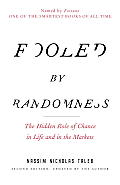
| Publisher: | Random House |
| Copyright: | 2004 |
| Printing: | 2005 |
| ISBN: | 0-8129-7521-5 |
| Format: | Trade paperback |
| Pages: | 291 |
After being impressed by The Black Swan, I looked up other books by Taleb (at least ones that weren't about technical details of financial markets) and found this, his first book on the same topic. I read the revised and expanded second edition, and I recommend anyone interested find that version.
Fooled by Randomness covers some of the same material as The Black Swan, but comes at it from a different angle and at a more leisurely pace. While The Black Swan is almost entirely concerned with the problem of induction and the impact of unlikely but highly influential events, Fooled by Randomness looks at randomness in a broader context and at all of the ways in which it distorts our thinking. It also focuses more specifically on markets and trading. It still ranges into other areas of life and general philosophy, but Taleb here provides more comprehensive examples of how the markets read meaning into events that have none inherently.
Among other things, this is the best and most comprehensive treatment of analysis problems around randomness that I've read. Taleb's explanation of survivorship bias, particularly with regard to financial traders, is exceptional and worth the book by itself. Among other approaches to the topic, he outlines a known con game relying on a variation of survivorship bias that's a particularly effective and nasty way of pointing out the limitations of narrow observations. Other memorable sections include his discussion of regression to the mean and lucky streaks, and how he approaches his own tendency to be fooled by randomness (particularly the afterword). Despite to some extent repeating discussion of the problem of indunction from The Black Swan, I found both treatments interesting and informative in different ways.
One of the core concepts of this book is ranges of possibility and the idea of optimising for the best average outcome across all possible outcomes instead of focusing on one specific outcome. It takes a bit to wrap one's mind around this, but Taleb takes it slow, talks through Monte Carlo simulations, and provides a great introduction for people who haven't heard about randomized algorithms before. This is very useful background, filling in some of the gaps in The Black Swan and making Fooled by Randomness both more actionable and more persuasive. Taleb shows how optimizing for the best average outcome can result in unintuitive and sometimes apparently very risk-averse choices, and how much of a struggle it is for human brains to not assign special significance to the outcome that occurred. It's a lovely bit of counterintuitive mind-expansion that provided me a much better handle on how Taleb proposes dealing with unlikely but revolutionary events.
Fooled by Randomness is a less focused book than The Black Swan and a bit prone to rambles and digressions, but in those digressions it covers more material at greater depth. It doesn't have the same single unifying idea, and it didn't leave me feeling like I'd just seen a key part of the world I'd never noticed before. Instead, I came away pondering a variety of smaller ideas, thinking about prediction and expectation in new ways, and feeling like I understood statistics more thoroughly than I had before. It fulfills a lot of the nagging desire for more depth that I had left after The Black Swan, and I think anyone who enjoys either book would enjoy reading both.
As in The Black Swan, Taleb is irreverant, abrasive, and very entertaining. I found Fooled by Randomness more thoughtful and less hyperbolic in tone, which in places makes it slightly less entertaining but more defensible. It's also, like the treatment of the problem of induction, still entertaining if you've already read The Black Swan, which is impressive for two books written on nearly the same subject. Taleb recycles a few comments and bits of sarcasm, but the ones he does repeat are the ones I didn't mind hearing again.
I think this is a slightly better book than The Black Swan, although I'm not surprised that it makes less of a splash. It doesn't grab the reader with one big idea in the same way; instead, it surrounds and builds up a way of thinking about the world. If you have to pick between the two, I recommend Fooled by Randomness instead, but I enjoyed reading both.
Reviewed: 2008-05-17